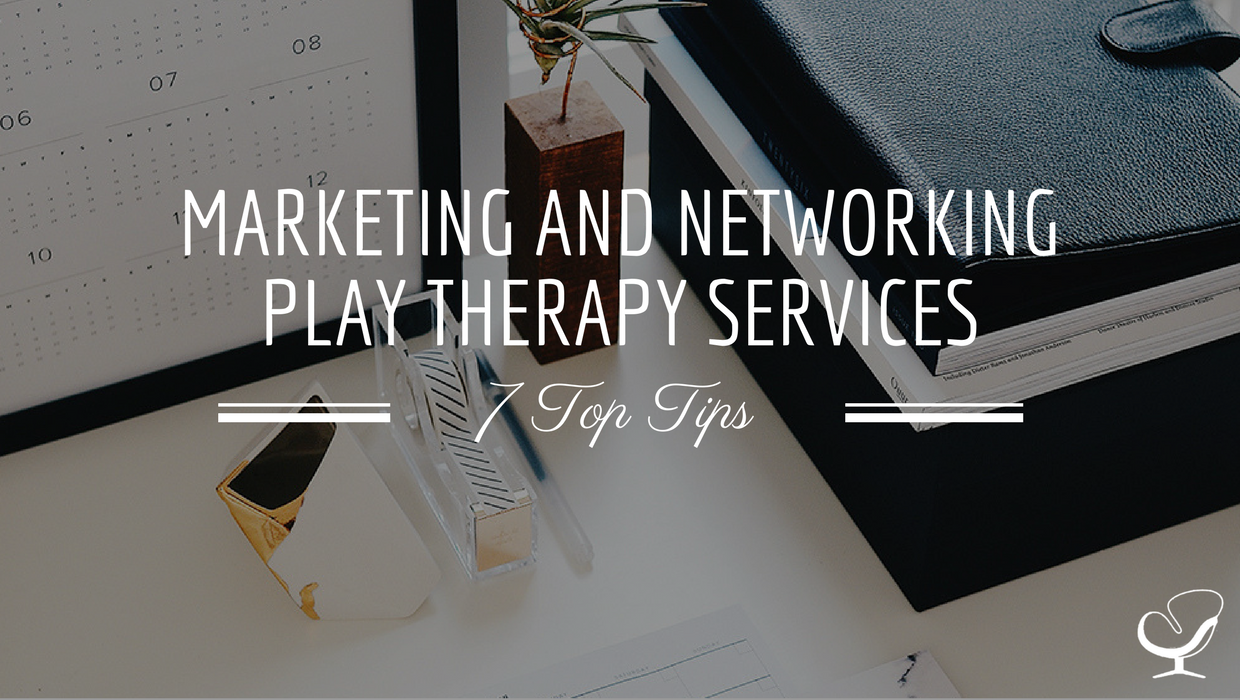I remember when the economy was in a serious slump. One of my colleagues, who sees only adult clients, commented on how his phones had stopped ringing. He went on to say that he suspected it was because people were moving therapy services to the bottom of the financial priority list, given the sluggish economy. I responded telling him that my play therapy practice was actually burgeoning during that time. Together we concluded that, regardless of financial hardship, parents will always find way to get help and support for their children. That’s good news for play therapists!
Being a play therapist within the greater realm of psychotherapy comes with specialized services, serving a specialized population, requiring specialized marketing and networking strategies. It’s important to know how to put yourself out there as the expert you are in the arena of helping children. This is so that parents who are seeking help for their kids will see you as their chosen professional.
Top 7 Tips for Specialized Marketing and Networking
In my work training and mentoring therapists who want to grow a play therapy private practice to thriving success, I like to share my top seven tips for specialized marketing and networking to yield a flow of ongoing referrals.
1. Be Authentic
Be authentically yourself, focusing on relationship building in your community. You can not hide in your play room and simply hope new clients into ringing your phone. We are in the business of human relationship and it’s essential you show up as the warm and wonderful human helper you are. Attend community events. Introduce yourself to other professionals. Show that you are interested in what they do in their work! Ask questions. Be active in local charity events. Aim to be seen in and around town. Be yourself. The more real relationships you build the more referral sources you will have.
2. Use Social Media
Utilize social media for authentic relationship building. Don’t use social media as a sales platform. Don’t buy ads on Facebook. Join local community groups. School groups. Parent groups. Community issue groups. Be supportive. Ask questions. Engage with people. Connect. Show up as the warm and wonderful human you are and use these virtual connections to launch into real time meetings with other professionals or community leaders.
3. Find Parents
Go where the parents are. Consider where parents are taking their children for other services and activities. Ballet studios, karate dojos, pediatric dentists, family chiropractors, pediatricians, child development centers. Connect with the people there. Get to know the professionals, the receptionists, the instructors. Show interest in what they have to offer and invite them to provide you with some flyers or cards to place in your office waiting room. Offer to do a free coffee-talk for parents while the children are in class on positive parenting or another topic that may be of interest. Ask if they will be willing to have your cards out on display for parents to see.
4. Be Seen as the Helpful Expert
Be seen as the expert who wants to help. Make yourself available to be a free speaker and provide brief presentations packed with useful support information for parents and teachers at PTA meetings, community organizations, or Moms of Preschoolers meetings. Dig into your community for opportunities to get in front of a group of people and share just enough valuable information that they will want to schedule a session with you for their child. Every time I’ve ever done a free talk in my community, I have always come away with at least one new client.
5. Network With Other, Similar Therapists
Get to know therapists who only see adults. Therapists with adult clients love having a solid referral list of qualified children’s therapists to refer to. Think about it. They are seeing adults who often have children who need to be seen by their own therapist. You will do well to build some authentic relationships with other therapists who see only adults.
6. Nurture Relationships
Nurture your new relationships. It’s not enough to meet someone one time and then expect them to be a ready referral resource for you. Take time to meet once, follow up after, reach out again, offer to be a referral source for them, and show ongoing interest. Don’t turn into an annoyance to someone if they don’t respond to your efforts after a couple of tries, but don’t let the initial connection grow cold either.
7. Build School Connections
Saddle up to the school connections. Children go to school most of their waking hours. They have teachers and school counselors and principles who need to know who you are so they can refer parents of children with struggles to you for play therapy. It’s not enough, however, to drop off a bunch of business cards. Review #1 and #6. Work every opportunity to get to know the people at the local schools in a way that they see you as helpful, responsive, warm and wonderful.
There’s No Excuse!
People often find it very difficult to believe that I am actually an introvert. I’m seen as being so outgoing and enthusiastic in my local and online communities. But, I had to work at it! I had to consistently put myself out there and make it work early in my career. And, I learned that, while I still need my alone time to recharge, it’s essential to success to know how to effectively market and network using authentic relationship building. If I can do it – and have had the success I’ve had – anyone can! Take those seven top tips, build a phenomenal referral source base, and never want for clients again.
 Lynn Louise Wonders, LPC, RPT-S, CPCS, has been practicing play therapy since 2002 and has been training, supervising, and providing practice-building consultation and mentoring to therapists since 2010. She is an APT Approved Provider for Play Therapy Training and a Registered Play Therapist-Supervisor. She founded and built two successful play therapy group practices in metro Atlanta between 2007 and 2017, and has created a rich bank of play therapy training webinars and recorded workshops utilized by therapists worldwide. Lynn leads a 90-day Mentoring MasterMind for therapists, as well as private business coaching and mentoring services. You can read more about her training and services at www.wonderscounseling.com.
Lynn Louise Wonders, LPC, RPT-S, CPCS, has been practicing play therapy since 2002 and has been training, supervising, and providing practice-building consultation and mentoring to therapists since 2010. She is an APT Approved Provider for Play Therapy Training and a Registered Play Therapist-Supervisor. She founded and built two successful play therapy group practices in metro Atlanta between 2007 and 2017, and has created a rich bank of play therapy training webinars and recorded workshops utilized by therapists worldwide. Lynn leads a 90-day Mentoring MasterMind for therapists, as well as private business coaching and mentoring services. You can read more about her training and services at www.wonderscounseling.com.

